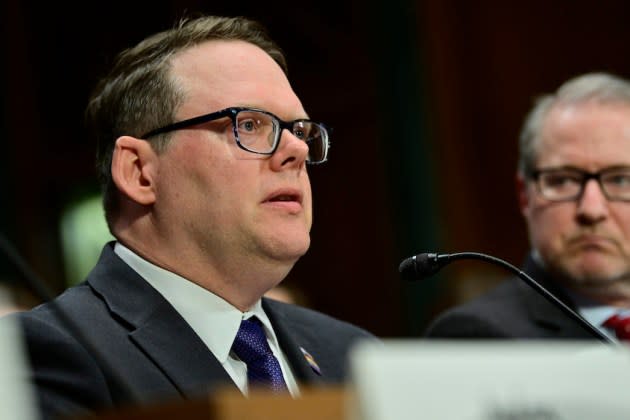Duncan Crabtree-Ireland Urges Lawmakers To Extend AI Bill Protections In Perpetuity, Calls Deepfakes An “Existential Threat”

SAG-AFTRA’s Duncan Crabtree-Ireland urged lawmakers to move forward with an AI bill which seeks to provide historic protection against generative artificial intelligence.
“AI technology, left unregulated, poses an existential threat not only to SAG-AFTRA’s members, but to civil discourse, student health & welfare, democracy and national security,” he said during his testimony to members of the Senate Judiciary Committee’s Subcommittee on Intellectual Property about the NO FAKES Act (read it here).
More from Deadline
In addition to requiring informed consent for digital replicas, the bipartisan NO FAKES Act — or the Nurture Originals, Foster Art, and Keep Entertainment Safe Act — offers historic federal IP protections against the misappropriation of voice and likeness performance in sound recordings and audiovisual works.
Artificial intelligence was a cornerstone of SAG-AFTRA’s negotiations with the Hollywood studios last year and one of the sticking points that prompted the actors union to go on strike for 148 days. As a result, SAG-AFTRA (along with the WGA and the DGA) secured provisions to protect their members from the use of AI.
SAG-AFTRA also negotiated AI protections in its contract with the recording industry, and it is seeking similar provisions in its Interactive Media Agreement with the video game companies, though those talks are ongoing.
However, Crabtree-Ireland argued Tuesday that federal regulation is necessary to fully protect the union’s members, because they “cannot control what others do with AI generated digital replicas of them and cannot successfully demand compensation for that use.
“For an artist, their voice and likeness are the foundation of their performance, brand, and identity, developed over time, through investment and hard work. Taking that voice and likeness is a form of theft. It is definitely unethical and must be made illegal,” he said.
Crabtree-Ireland also argued for the necessity of all people to be protected from the use of digital replicas, using his own experience as an example, explaining that a deep fake video of himself appeared on the internet last year urging SAG-AFTRA members not to ratify their new three-year contract.
“Despite a disclaimer in the fine print of the caption that it was a deepfake, many members never saw or read that disclaimer. I was contacted by many members asking me why I opposed the very contract I had worked so hard to negotiate,” he said. “But beyond that, there is something uniquely dehumanizing in having your own voice and image turned against you, turning any conception of freedom of speech on its head. To have your own voice used to speak the opposite of what you believe – and have no way to stop it – is the ultimate violation of everyone’s right to freedom of expression and association.”
Crabtree-Ireland was joined by several others, including recording artist FKA twigs, who also spoke strongly in support of the NO FAKES Act. She told the senators that, over the last year, she had developed her own deep fake in order to use it for her own creative purposes — and reiterated how it could be exploited were it in the hands of anyone else who didn’t have her consent to use it.
“I’ve worked so hard throughout the whole of my career and when I die, I would like all this, everything that I’ve created, to go to my family and my estate that will have clear instructions of the way I want to preserve my history and all of the art that I’ve created,” she said.
Crabtree-Ireland agreed with twigs that individuals should retain the right to consent to use of digital replicas in perpetuity, even after death, because “this is about a person’s legacy.”
“Every one of us is unique. There is no other twigs, and there never will be. There is no other you or you or any of us. This is not the same thing as copyright,” he said, referencing the limitations of copyright protections, which generally last for the life of the creator plus 70 years.
He continued: “So from my perspective, this is an intellectual property right that deserves protection. It should absolutely be protected after death, and I’m waiting to hear a good reason why it shouldn’t be, to be honest with you.”
The NO FAKES Act is sponsored by Sens. Chris Coons (D-DE), Marsha Blackburn (R-TN), Amy Klobuchar (D-MN) and Thom Tillis (R-NC).
Best of Deadline
Step & Repeat Gallery: The Best Red Carpet & Party Photos Of 2024
Hollywood & Media Deaths In 2024: Photo Gallery & Obituaries
2024-25 Awards Season Calendar - Dates For Oscars, Tonys, Guilds, BAFTAs, Spirits & More
Sign up for Deadline's Newsletter. For the latest news, follow us on Facebook, Twitter, and Instagram.

